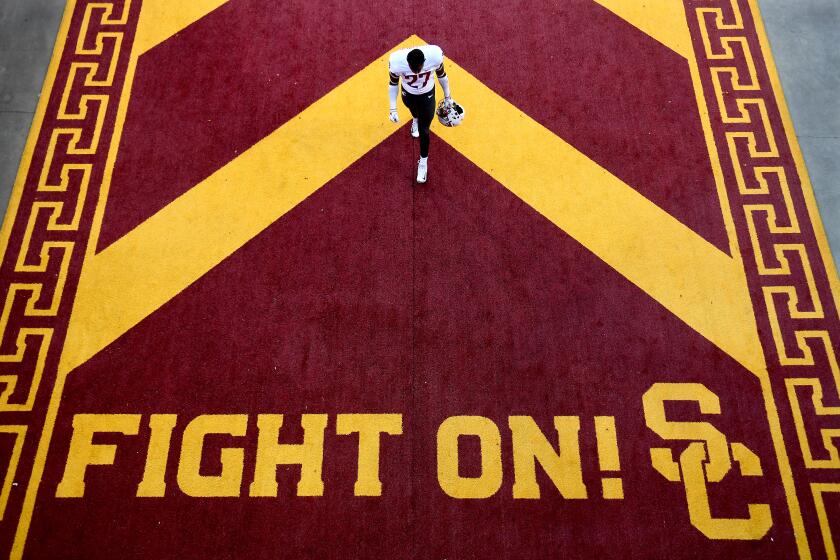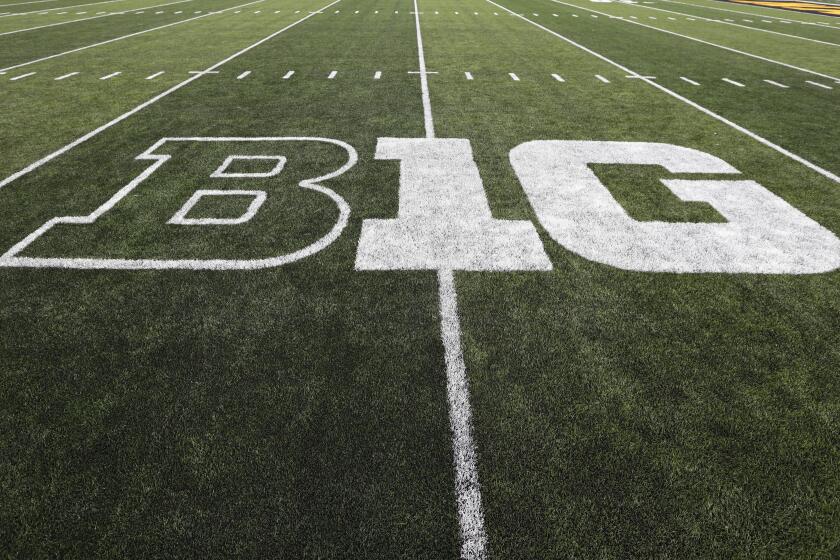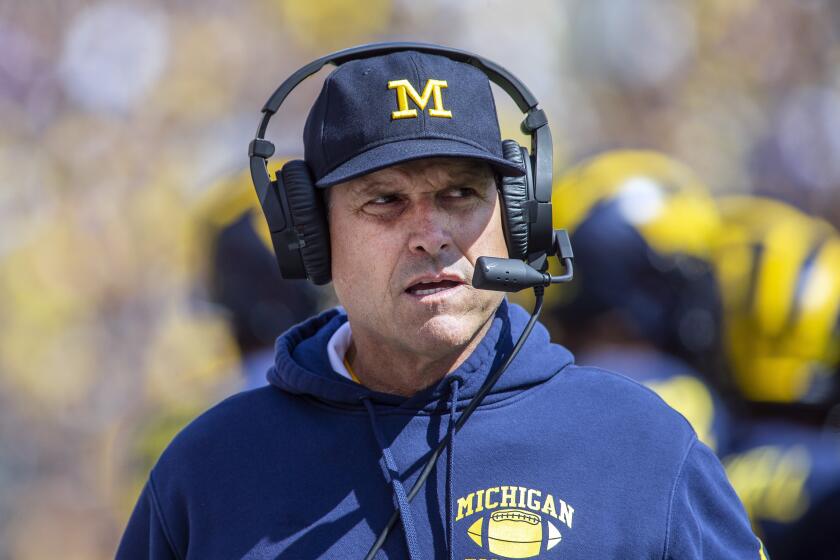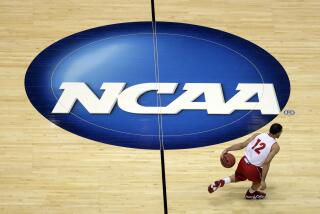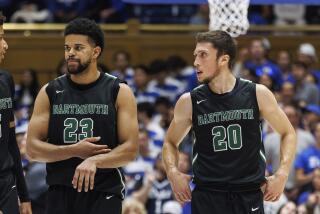Commentary: There’s a path to playing college football. Clearly, lawyers have found it
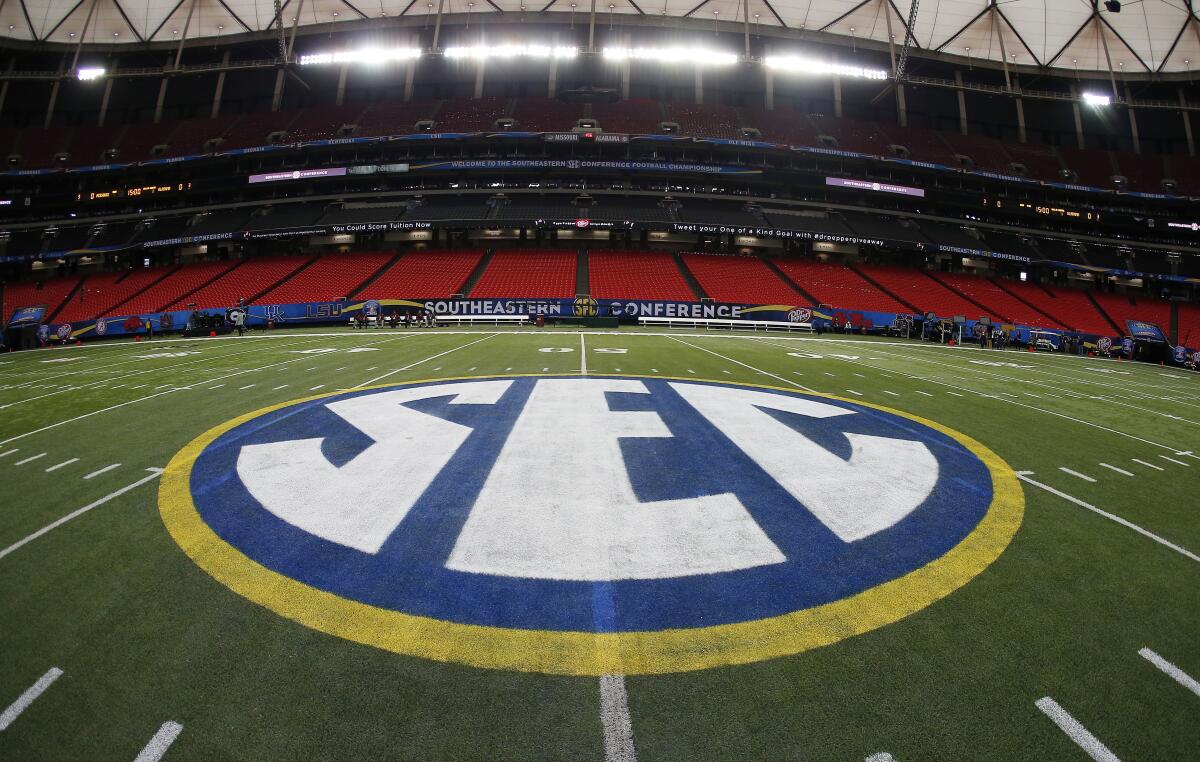
- Share via
Across college athletics this week, as the foundation shook under the weight of several historic decisions by university presidents, doctors took center stage.
The science and data that have been collected on COVID-19 and what the virus is doing to supposedly invincible college football players sent the Big Ten and Pac-12 conferences into punt formation. Meanwhile, with the same information available, the Big 12, Atlantic Coast and Southeastern conferences dug in their cleats and decided they’d keep the ball moving toward a fall season.
Doctors are among the heroes of the pandemic, risking their lives and families’ lives for the greater good. If there was ever a time to put faith in their advice, it is now. But already, and certainly in the years to come, another industry is poised to seize an outsize influence on our country’s favorite “amateur” enterprise:
Lawyers.
In modern college sports, billable hours remain undefeated and, if the Big 12, ACC and SEC get their way, schools and conferences will need to lawyer up at new levels. For once, the NCAA won’t be the one taking the heat in court, since the association canceled its fall championships and does not oversee the Football Bowl Subdivision’s championship.
“I feel like the Titanic — we have hit the iceberg and we’re trying to make decisions of what time we should have the band play,” Dr. Carlos del Rio, an infectious disease expert on the NCAA’s COVID-19 advisory group, said.
The Pac-12 canceled its sports schedule through the end of 2020 because of the coronavirus crisis. The Pac-12 and Big Ten hope to hold football seasons in the spring.
Imagine being a plaintiffs’ attorney right now. The specter of class-action lawsuits filed toward schools by players who experience short-term and long-term health issues related to contracting COVID-19 was too much to ignore for the Pac-12 and Big Ten, which had players organizing under #WeAreUnited and #BigTenUnited.
Thus far, Big 12, ACC and SEC players have not organized their own movements.
“I don’t believe in coincidences,” said Angela de Cespedes, a Miami-based litigation partner with Saul Ewing Arnstein & Lehr who has counseled professional sports leagues facing a crisis to minimize the risk of litigation.
“There are so many different factors at play here that I don’t think the decision was made purely from a health and safety standpoint. The fact that the Big Ten and Pac-12 decided to pull the plug when they did, quite frankly, was an effort to stop the bleeding.
“You’ve got athletes, feeling pretty powerful, making demands of these colleges for the things they want, and that’s a slippery slope.”
The Big Ten became the first Power Five conference to postpone its fall football season because of the pandemic. It hopes to play in the spring.
Without their athletes applying pressure, the other three Power Five leagues could more easily continue to monitor the virus’ spread around their campuses, especially once students who are not athletes return, and buy themselves time to evaluate their options.
Plus, according to De Cespedes, school and conference attorneys were likely able to make a compelling case about their ability to defend COVID-19 lawsuits.
“From a liability perspective, if you catch COVID-19, there’s absolutely no way with any scientific degree of certainty to track where you caught that virus, who gave it to you, how you contracted it,” De Cespedes said. “One reason we haven’t seen a lot of lawsuits yet on this issue is because it’s impossible to prove, and most good lawyers understand that.
“Now that’s not to say you’re not going to get sued 500 times as a result of playing.”
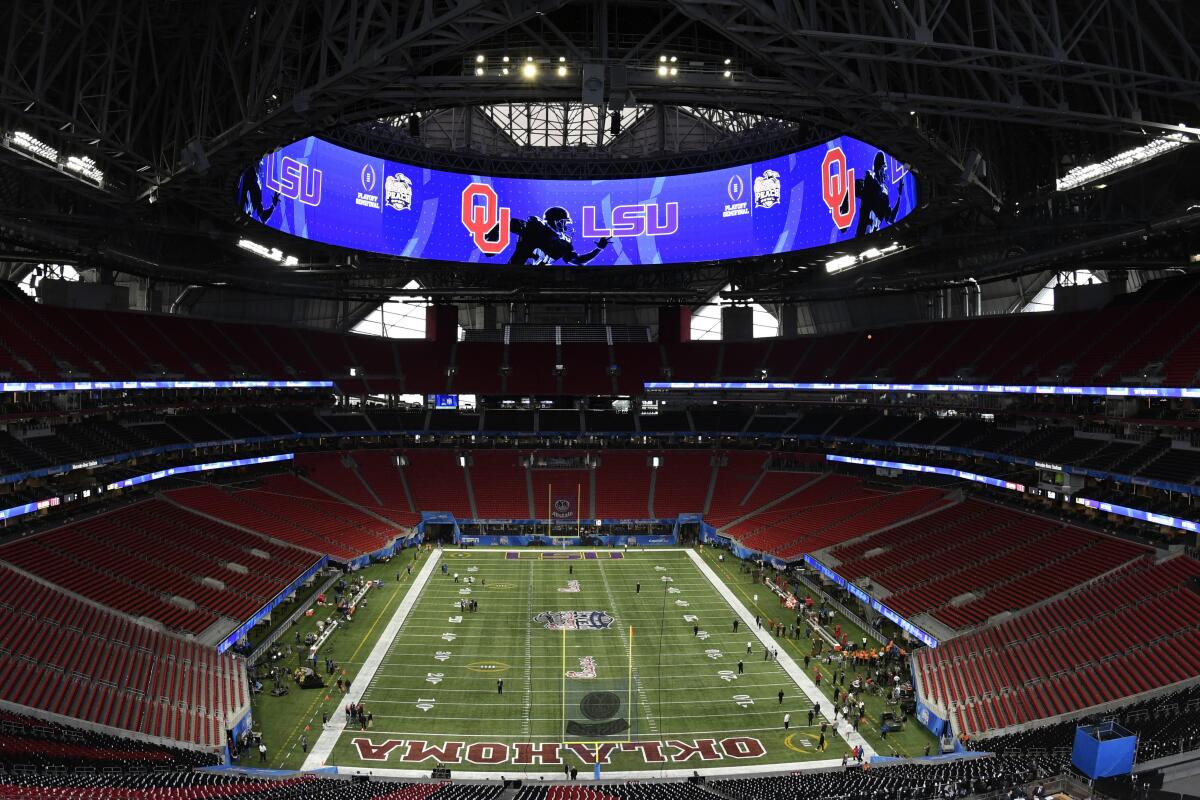
Universities will have a big enough issue on their hands with thousands of non-athlete students returning, and many have decided to create that inevitable petri dish for the virus. If that made it through a risk assessment, playing sports, with all the resources in place to test athletes, is not going to sound an alarm — as long as the athletes aren’t threatening the amateur model by pushing for the ability to collectively bargain for their rights.
Surprisingly, the idea of forming sports bubbles in college sports picked up steam Thursday when NCAA President Mark Emmert said it was under consideration for men’s basketball. Just two days earlier, Pac-12 Commissioner Larry Scott said that “student-athletes” can’t be bubbled. The implication is that you would no longer be able to argue in the court of law or public opinion that college athletes are no different than students who aren’t athletes.
These are unprecedented times, of course, so maybe Emmert thinks the NCAA could navigate legal challenges that assert athletes’ claim to their share of March Madness revenues because it was played in an off-campus bubble.
The college football season is in serious peril because of the COVID-19 pandemic. But what spurred the Big Ten to push for the season to be canceled?
For now, the Big 12, ACC and SEC could have found the legal sweet spot: Bring the athletes back to campus, just like other students, let them all try to figure out where exactly they got COVID-19, and watch the TV broadcast money from games pour into athletic coffers.
It would be quite a bet to make. For her part, De Cespedes would advise those leagues to play on.
“We have to deal in reality, and reality is, you do the best you can, like every other business that is reopening,” she said. “You have certain plans in place to stop the spread if it gets out of control, then dial it back. I’m not sure that canceling the fall was the right call.”
More to Read
Go beyond the scoreboard
Get the latest on L.A.'s teams in the daily Sports Report newsletter.
You may occasionally receive promotional content from the Los Angeles Times.

